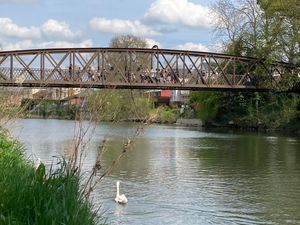Navigating the planning process - Balancing infrastructure development and environmental protection in Shropshire
In a recent debate in Westminster Hall, the issue of planning reform and how it relates to Shropshire was brought to the forefront by Shrewsbury MP Daniel Kawczynski.
Watch more of our videos on ShotsTV.com
and on Freeview 262 or Freely 565
Specifically, Mr Kawczynski raised concerns regarding the challenges faced in infrastructure development, citing the ongoing saga of the North West Relief Road (NWRR) and questioning the role of environment protections in hindering such projects.
While the planning process in the UK, and by extension Shropshire, aims to strike a balance between fostering development and protecting the environment, it often finds itself at the centre of debates due to its complexity and sometimes conflicting objectives.
The underlying reason people in Shropshire should be getting involved in this debate is that people really are moving to the county, and the population flow isn't likely to stop. What can we do about that?
With that in mind, maybe this article can serve as a starting point for the debate, with the pros and cons of the planning process outlined below:
Pros
Environmental Protection: One of the objectives of the planning process is to safeguard the environment. Planning regulations ensure that development projects are assessed for their potential environmental impact, helping to mitigate adverse effects on ecosystems, biodiversity, and natural resources. Reasonable questions about the North West Relief Road's impact on drinking water, for example, have been raised. You can read more about this point with specific reference to the North West Relief Road here: https://plus.shropshirestar.com/news/local-hubs/shrewsbury/2023/05/09/relief-road-plans-hit-by-environment-agencys-drinking-water-concerns/ Or here: https://plus.shropshirestar.com/news/environment/2023/10/31/the-case-for-and-against-building-the-north-west-relief-road/
Community Engagement: The planning process provides opportunities for public participation and input, allowing local communities to voice their concerns and preferences regarding proposed developments. This fosters transparency and accountability, ensuring that decisions align with the needs and interests of residents - in theory.
Long-Term Sustainability: By considering factors such as sustainability, conservation, and urban design, the planning process strives to promote long-term environmental and social sustainability. This includes provisions for green spaces, sustainable transportation, and energy-efficient infrastructure.
Preservation of Heritage: Planning regulations often include provisions for the preservation of cultural heritage sites and architectural landmarks. This helps to maintain the historical character and identity of communities, contributing to their cultural richness and heritage tourism. This is of particular importance to parts of Shropshire, including Shrewsbury.
Cons
Delays and Uncertainty: The planning process in the UK is known for its complexity and bureaucracy, often resulting in delays and uncertainty for development projects. This has certainly been the case, for better or worse, with the North West Relief Road. Lengthy planning applications, appeals, and legal challenges can hinder progress and increase costs for developers and investors.
Regulatory Burden: Strict planning regulations and environmental assessments can impose a significant regulatory burden on developers, leading to increased costs and administrative hurdles. This may deter investment in infrastructure projects and hinder economic growth in certain regions.
Conflicting Objectives: Balancing the need for infrastructure development with environmental protection goals can lead to conflicts within the planning process. Projects deemed essential for economic growth and connectivity may face opposition from environmental groups and regulatory bodies concerned about ecological impact. You can read more about the conflicting view points here: https://www.shropshirestar.com/news/local-hubs/shrewsbury/2024/03/10/shropshire-council-releases-110-million-tender-to-find-contractor-to-construct-north-west-relief-road/
Inconsistent Decision-Making: Decisions made by local planning authorities may lack consistency due to varying interpretations of planning policies and guidelines. This can create uncertainty for developers and lead to disparities in development outcomes across different regions.
Addressing the challenges associated with the planning process requires a comprehensive approach that acknowledges the importance of both infrastructure development and environmental protection.
Efforts to streamline planning regulations, improve stakeholder engagement, and enhance coordination between government agencies can help facilitate smoother and more efficient decision-making.
Moreover, investing in sustainable infrastructure projects that prioritise environmental stewardship and community well-being can foster inclusive and resilient development for future generations.
As discussions on planning reform continue, finding the right balance between competing interests remains paramount in shaping the future of infrastructure development in the UK.
*We're genuinely interested in what the people of Shropshire have to say on this issue, especially our readers who don't normally speak up. Please leave your comments below or email your letters to webdesk@shropshirestar.co.uk.




